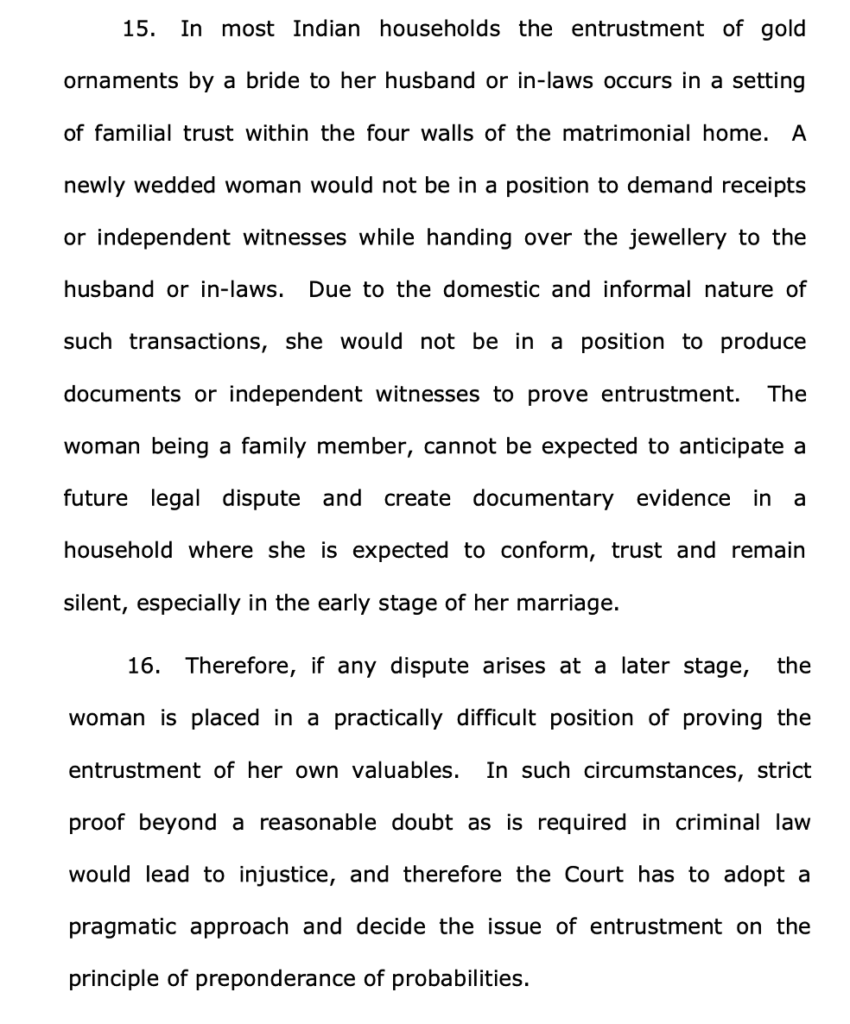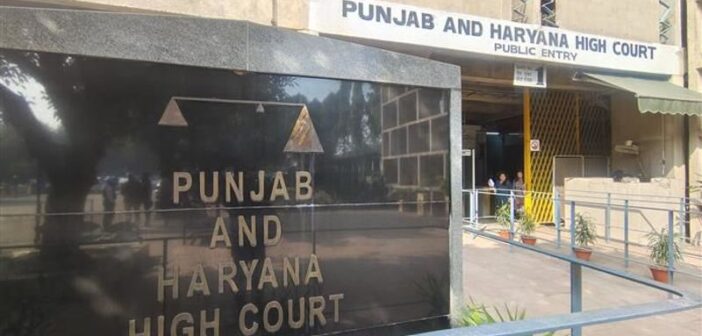In this edition of Court judgements, we look at the Delhi HC’s judgment that rejected 12th regular bail application filed by a petitioner, accused of molesting and murdering a Minor girl, Punjab and Haryana HC’s order that convicts can initiate contempt proceedings if the parole application is not decided within 4 months, Bombay HC’s order that no woman can be arrested after sunset and before the sunrise, except in exceptional circumstances, among others.
Delhi HC: Rejects 12th Regular Bail Application filed by petitioner, accused of molesting and murdering Minor Girl
In Rajab Ali Khan (Petitioner) vs. State of NCT of Delhi (Respondent), the Delhi High Court (HC) dismissed the 12th regular bail application filed by the petitioner, accused of molesting and murdering a minor girl, and has been in prison for 7 years.
The facts of the case were that a minor victim disappeared after attending tuition at the petitioner’s house on 22 October 2018. Her body was found on 28 October 2018. Petitioner, in connivance with his wife, allegedly lured the victim, administered sleeping pills, sexually assaulted her repeatedly, and then murdered her by smothering when her condition deteriorated. He then disposed of her body in Biodiversity Park, Wazirabad.
The Court found strong prima facie evidence against the applicant, including the mother’s “last seen” statement placing the victim with the accused, CCTV footage showing petitioner transporting a suitcase on his scooter near the dumping site, recovery of the victim’s clothes and ligature material (handkerchiefs) at his instance, which matched forensic findings, and FSL reports confirming Clonazepam and Mefenamic Acid in tablets recovered from him, consistent with sedating the victim. The post-mortem report confirmed repeated sexual assault and asphyxia due to ligature strangulation.
Considering the gravity and heinous nature of the offence and the strong prima facie material, the Court dismissed the bail application. However, the trial Court was directed to expedite the recording of evidence.
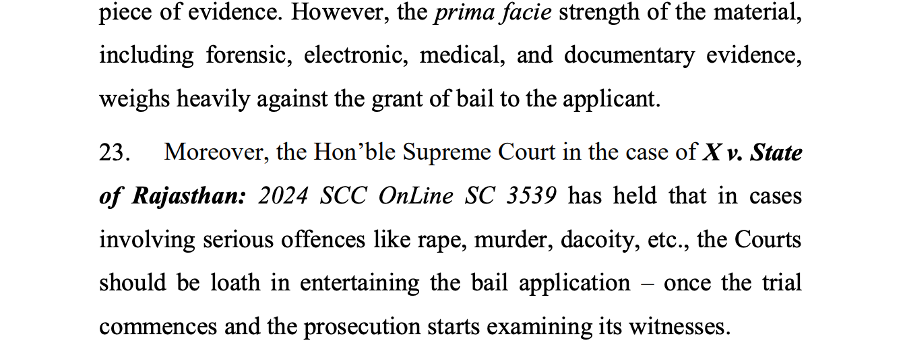
Bombay HC: No woman can be arrested after sunset and before sunrise, except in exceptional circumstances
In Smt. Sujata (Applicant) vs. The State of Maharashtra (Respondent), the Bombay HC granted regular bail to the applicant accused of economic offences, on the grounds of non-communication of the grounds of arrest and the arrest took place after sunset.
The facts of the case were that the applicant, the former Chief Executive Officer of “Babaji Date Mahila Sahakari Bank Limited, Yavatmal,” was arrested on 30 September 2024, for alleged irregularities and illegalities involving loans obtained by her husband and relatives, leading to a total fraud of over Rs. 242 crores.
The applicant contended that she was arrested after sunset, which is a violation of Section 46(4) of the CrPC (now Section 43(5) of BNSS, 2023). The court noted inconsistencies in the arrest timings provided by the prosecution, with some documents indicating an arrest at 10:39 PM, while others showed 5:30 PM. The court emphasised that Section 46(4) mandates that no woman shall be arrested between sunset and sunrise, except in exceptional circumstances with prior permission from a Judicial Magistrate.
Further, the court held that the grounds of arrest were not communicated to the applicant’s relatives, which is a violation of Article 22(1) of the Constitution and Section 50A of the CrPC (now Section 48 of the BNSS). The court stated that mere information of arrest is different from furnishing the grounds of arrest, and the burden is on the arresting agency to prove compliance.
Despite the economic nature of the offence, the court concluded that the illegal arrest and non-communication of grounds for arrest warranted bail. The applicant was released on a P.R. Bond of Rs. 1.00 lakh with two solvent sureties and strict conditions.
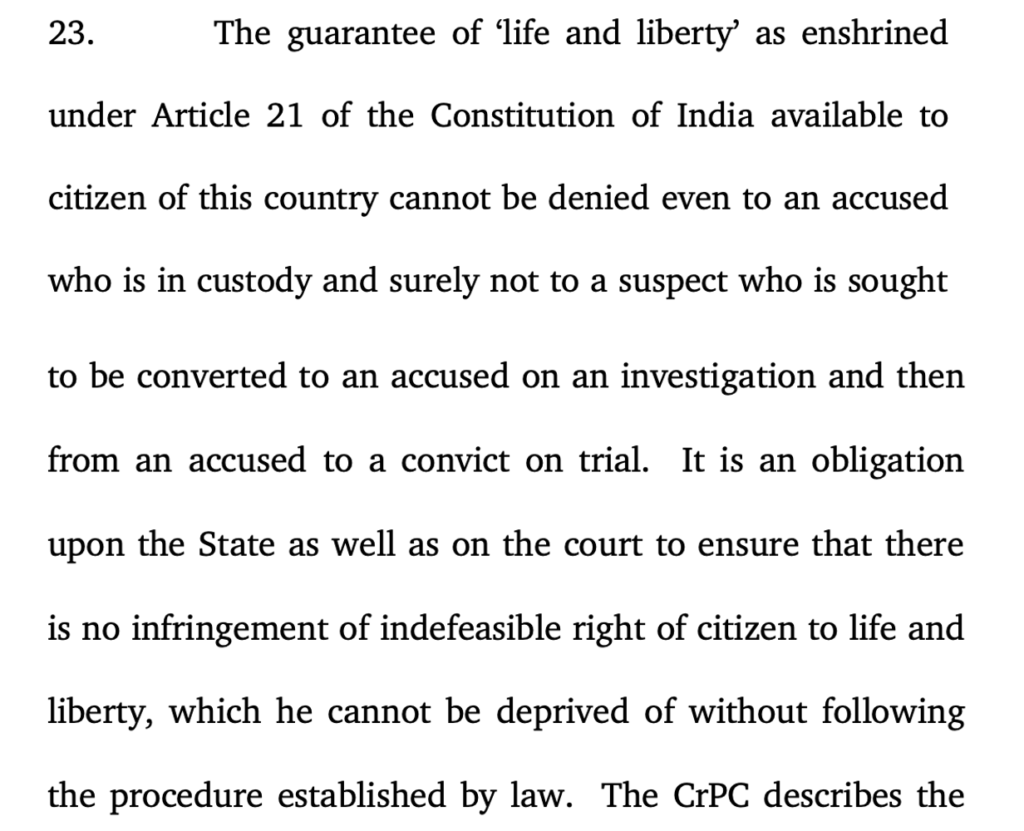
Punjab and Haryana HC: Convicts can initiate contempt proceedings if the parole application is not decided within 4 months
In Jaspal Singh @ Jassa (Petitioner) vs. State of Punjab and others (Respondents), the Punjab and Haryana HC held that applications from convicts seeking parole should be decided within 4 months by the authorities, failing which the convicts would be at liberty to initiate contempt proceedings.
The facts of the case were that the convict-petitioner sought release on parole for six weeks to meet his family members, under the Punjab Good Conduct Prisoners (PGCP) Act, 1962. He was convicted under the Narcotic Drugs and Psychotropic Substances Act, 1985, and sentenced to 10 years of rigorous imprisonment. As of 7 July 2025, he had undergone an actual sentence of 1 year, 8 months, and 24 days. His parole application was pending decision from authorities for 10 months. Thus, he approached HC.
The petitioner’s counsel argued that an application for temporary release on parole, filed on 16 September 2024, had been pending for almost 10 months without action, violating his fundamental rights under Article 21 of the Constitution of India, especially that the petitioner is a married man with two children, and an ailing mother.
The court emphasised the humanitarian object of the PGCP Act, stating that temporary release aids in the rehabilitation and reintegration of prisoners and incentivises good conduct. It expressed deep concern over the “laxity” and “undisciplined approach” of State agencies in handling such applications, highlighting that prisoners retain their fundamental rights under Article 21.
Consequently, the court disposed of the petition with a direction to the district magistrate to decide the petitioner’s parole application expeditiously, preferably within two weeks from the receipt of the order.
Furthermore, the Court directed that all future applications for temporary release on parole be decided by the concerned authority within four months from receipt. If it is not complied with, the convicts would be liberty to initiate contempt of court proceedings for unjustified delays.
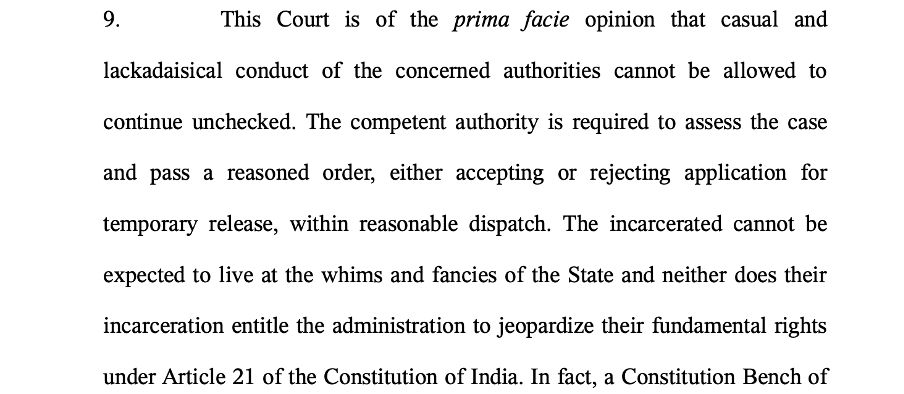
Kerala HC: Private Hospitals must pay minimum wages to housekeeping staff
In the case of Korambayil Hospital & Diagnostics Centre (P) Ltd. and Anr vs State of Kerala and others (Respondents), the Kerala HC held that a private hospital must pay minimum wages to housekeeping staff.
The facts of the case were that the first petitioner is a private hospital, and the second petitioner is a facility management company providing housekeeping staff to the hospital on a contract basis. The writ petition challenging an order that directed them to pay minimum wages to employees.
The core dispute revolved around which minimum wage notification was applicable. The petitioners argued that Ext.P3, a notification for sweeping and cleaning services, applied to their employees, as they were designated as “cleaners” in an agreement. They claimed to be paying wages higher than those stipulated in Ext.P3. However, the Assistant Labour Officer, Malappuram, had registered a Minimum Wages Application and subsequently, the Deputy Labour Commissioner directed the petitioners to pay arrears and compensation totalling Rs. 7,31,679 each to 34 employees, based on Ext.P4 notification applicable to private hospitals. This notification included “housekeeper” under Group 6 with a fixed pay scale.
The Government Pleader argued that “housekeeping” services, which include cleaning and maintaining hygiene in a hospital, fall under Ext.P4, which specifically covers employment in private hospitals. The court, upon reviewing Ext. P1 agreement, found that the second petitioner was responsible for “House Keeping Conservancy Services” for the hospital, indicating the employees’ work was akin to housekeepers, not just cleaners.
The court also rejected the petitioners’ argument that the first petitioner was not responsible for the wages, citing Section 2(e) of the Minimum Wages Act, 1948, and relying on the Hindustan Sanitary Ware case, which states that an “employer” includes one who employs directly or through another person.
Furthermore, the court emphasised the principle of “equal pay for equal work,” stating that denying proper wages to employees performing the same duties as housekeepers in hospitals would be exploitative.
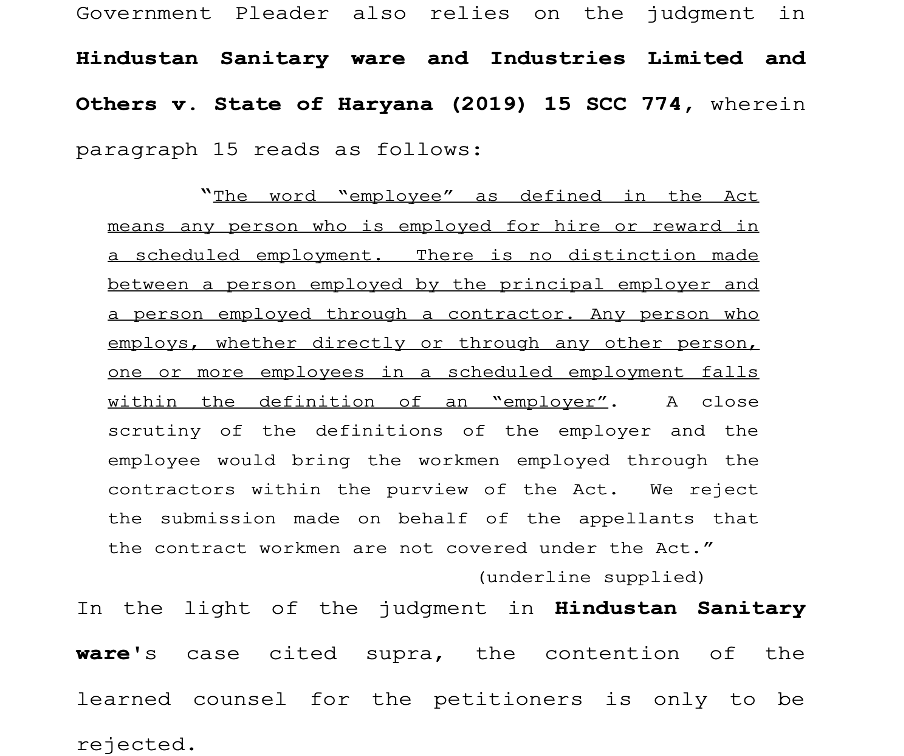
Kerala HC: Orders return of 53 sovereign gold ornaments by mother-in-law to daughter-in-law
In a matrimonial case between X vs Y, the Kerala HC ordered for return of 53 sovereigns of gold ornaments by the mother-in-law to the daughter-in-law.
The facts of the case were that the marriage between the petitioner (wife) and Pradeep (son of the second respondent, who is the mother-in-law of the petitioner, and brother of the first respondent) was solemnised in 2012. Pradeep, who was working abroad, committed suicide in 2013. The petitioner claimed that on her wedding day, she was adorned with 81 sovereigns of gold ornaments, of which 53 were given by her parents, 21 by her relatives, and 6 by her husband.
After the marriage, her husband’s mother and brother obtained her entire gold ornaments under the guise of safekeeping. She alleged cruelty and demanded the return of the ornaments after her husband’s death. The respondents denied receiving 81 sovereigns and claimed the ornaments were with the petitioner. The Family Court, based on evidence including purchase bills (Ext. P2 series) and wedding photographs (Ext. P3 series), found that 53 sovereigns of gold ornaments were purchased by the petitioner’s father. It ordered for return of ornaments to the daughter-in-law.
On appeal, the HC held that given the domestic nature of such entrustments, the petitioner’s version of entrusting the ornaments to her mother-in-law is more probable, as the entrustment of gold ornaments by a bride to her husband or in-laws occurs in a setting of familial trust in most Indian households. Together with it, the court also noted that the mother-in-law did not provide a plausible explanation for what happened to the 53 sovereigns, for which the petitioner has also produced necessary evidence. However, the court found that the first respondent (husband’s brother) resided separately, and there was no evidence to suggest he received any ornaments.
Therefore, the court ordered the mother-in-law to return 53 sovereigns of gold to the petitioner and also to bear the litigation costs.
